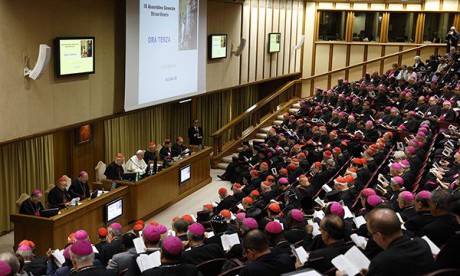Since the 2014 Extraordinary General Assembly of the Synod of Bishops a growing theological divide has become apparent.
This divide, evident among a small minority of cardinals and bishops present (and not present) at the Extraordinary Assembly, has been recognized through their views on how to “pastorally” apply Catholic teaching regarding marriage, family and sexual relations.
It has also come to light that a so-called secret planning group, seemingly consisting of this small minority together with some theologians and journalists, has been meeting to discuss such progressively theological opinions before the October Synod of this year.
The Church, since her inception, has been forced to define, and at times reiterate, the objective truth of the Faith in relation to error, hence the deposit of Catholic doctrine which has guided her for nearly 2000 years.
Such definitions, in the face of error, have primarily been discussed and defined in Ecumenical Councils.
Due in part to the remarkable media attention the Synod of Bishops has received, the Synod’s role in relation to Church teaching has become inflated and even exaggerated.
One of the primary guarantors and promoters of the true Faith is, and has always been, the College of Bishops (in communion with and under the Roman Pontiff) as ontologically always existing and governing the Body of Christ.
Indeed, the Second Vatican Council affirmed the three ways by which the Church can pronounce her teaching infallibly: through the College of Bishops spread throughout the world (when the Pope, having consulted all bishops’ opinions regarding a topic, declares a particular dogma; for instance when Pope Pius XII declared the corporeal Assumption of the Blessed Virgin Mary as a dogma of the Faith in 1950); in an Ecumenical Council (in which the entirety of the College of Bishops, with and under the Pope, is present); and by the Pope ex cathedra.
With the upcoming Synod of Bishops pronounced by Pope Francis to discuss issues related to the family and evangelization, and with confused understandings of what a Synod is, even among Catholics, it seems very timely to look at how the Church has officially defined it and what power it actually holds according to her own law. Continue reading
Sources
